Just in time for Wakefield!
With half of a year having passed since the London Show (and the Wakefield Show almost upon us), the RISCOSitory report is more than a little overdue – again!
The usual main excuse applies, which is that it’s always busy here in the bunker, and some things have to be put off in favour of other, more important tasks. However, it is now the turn of that task to be used to put off other less important things – so here, at long last, is your run down of what happened at the St Giles Hotel, Feltham, on Saturday, 27th October, 2018!
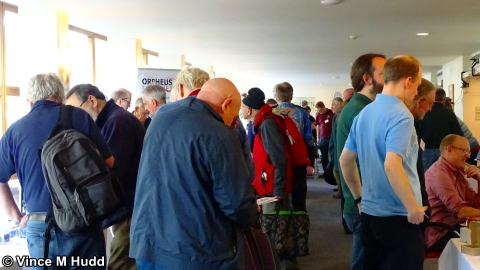
The show took place in its usual setting, the suite of exhibition rooms on the first floor, with the main room overlooking the street in front of the hotel. There are also three rooms leading off from this, one of which is used for the show theatre, and this year only one of the two others was used for exhibitors, with the other set aside as a seating area (with a Raspberry Pi also set up so that people could relax by playing games if they chose).
This report will follow a clockwise route through the main room, dipping into the side room as needed. Leo White recorded the various talks, with the videos available on YouTube – these will be linked in at appropriate points.
ROUGOL
Once you’d paid your entry fee and set foot into the show proper, the first stop on the RISCOSitory tour guide would have been the RISC OS User Group of London – the event’s organisers (with this, in fact, being the tenth such show that they’ve run). One of their main goals at the show is to tempt users, some of whom may not have travelled all that far, into popping along to the monthly ROUGOL meetings. These take place on the third Monday of every month, and usually feature an interesting speaker. Sometimes this will be someone well known in the RISC OS world, and sometimes someone more on the periphery but interesting and relevant nonetheless.
The stand this year also featured a number of Raspberry Pi-controlled LED displays, courtesy of Andrew Conroy, who himself could be found on the CJE Micro’s stand.
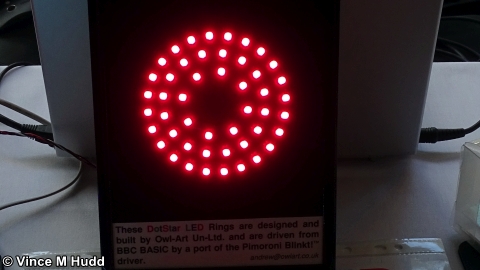
Archive
On the next stand, if you looked carefully, it was possible to spot the Lesser Spotted Archive Magazine. Editor Jim Nagel, who took over the publication from original editor Paul Beverley, could be found taking subscription renewals for the printed magazine and orders for the next edition of the CD/DVD compilation, which is currently a work-in-progress.
Chris Hall
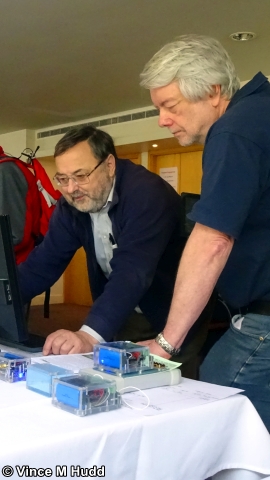
Following on from his GPS unit and software, which is not only able to record a GPX route for later display in Sine Nomine’s RiscOSM, but also to send GPS co-ordinates straight to the mapping application for a live map display, Chris Hall was demonstrating a new toy that he had developed for use on the Severn Valley Railway, for which he volunteers.
His data-logging device, which like the GPS unit is based around a Raspberry Pi, can be set up to monitor a number of inputs, logging (the clue’s in the name, really) events ready for later analysis – in the case of the Severn Valley Railway, its intended use is to monitor the signalling systems.
Chris was also selling FamTree, a genealogy application that allows the RISC OS filing system to be used as a source database from which it can generate a family tree. Chris first launched the application at the 2018 Southwest Show.
R-Comp
One of the regular larger stands at RISC OS shows is, of course, R-Comp‘s – always worth a visit for their vast range of hardware and software, and to pick up or hear about the latest updates, or new products. The London Show was no exception to this.
The company was demonstrating a hardware graphics acceleration module for ARMX6 and mini.m computers. Available for a hair under £30, the module can give the user a much smoother desktop operation, greatly improve scrolling through documents and moving windows around, and much more.
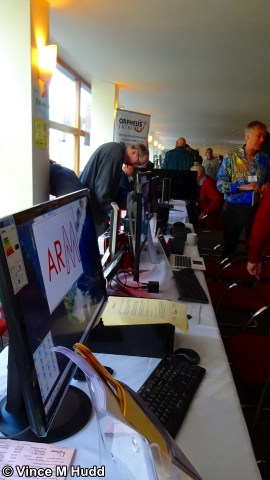
A new version of PiFi was also available. The product allows a ‘spare’ WiFi-enabled Raspberry Pi to be used as a WiFi access point for other RISC OS computers, and the third major version of the package featured new RISC OS desktop software, replacing the previous web-based solution that required a web browser to access and configure the connections. The new software presents an icon on the icon bar, reflecting signal strength and quality, and clicking on it allows other wireless networks to be seen and selected, etc.
But neither of those were the real headline act for R-Comp this year. That was a proper, ARM-based laptop.
Following the acquisition of Castle by RISC OS Developments, with ownership of RISC OS itself as part of the deal, and the subsequent change of licence from Castle’s shared source licence to the Apache open source one, Pinebook hardware had been made available to R-Comp for the purposes of porting the operating system to it, and thus releasing a proper laptop solution, rather than one based around another operating system emulating a RISC OS platform, or a laptop case being designed around a board.
Although still a new development at the time of the show, and thus nowhere near ready, R-Comp were able to show RISC OS running on the laptop, and were taking expressions of interest from those people who would like a true RISC OS laptop computer.
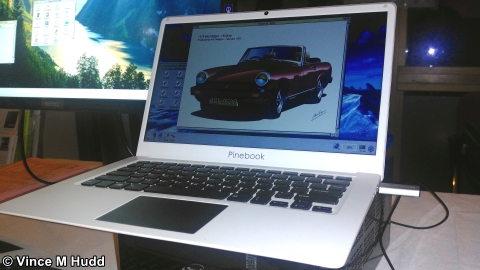
Unsurprisingly, that laptop was a key topic in Andrew’s talk, in which he also spoke a little on the new ownership and licensing arrangements of the operating system, the mini.m, and more.
RISC OS Developments and Orpheus Internet
Next to R-Comp, Richard Brown was representing both RISC OS Developments Ltd and Orpheus Internet.
As RISC OS Developments, Richard was talking to people about those two big items of news, the publicity gained by the company and by RISC OS as a result (news of the licence change, which was only announced a few days before the show, reached quite a number of websites beyond the usual RISC OS ones), and the potential benefits that could bring to the platform – with the laptop being just one example.
Giving one of the day’s talks, Richard covered all of this and more besides. Amongst other things, he mentioned that RISC OS Developments had taken on the services of a professional marketing company, Marketing by P, and was always keen to explore new opportunities to promote the operating system.
He also revealed the that the project for which the company was formed and sought investment, hitherto known only to those who had invested, was to bring a more capable web browser to the platform and, with the funds available, that a number of possibilities were being explored.
Switching to Orpheus Internet, Richard also mentioned that the project to crowdfund a datacentre had proven successful, and that work is now under way on the building that had been chosen.
Back in the hall, when not answering questions about RISC OS Developments, Richard was also wearing his Orpheus hat and talking up the benefits of using the most RISC OS-friendly ISP there is, with a range of connectivity packages to suit different needs, hosting solutions, and more.
North One Communications (Organizer)
Cut-me-own-throat Dibbler Nigel Willmott and Martin Avison were showing off the latest version of the – no, THE – personal information manager for RISC OS, Organizer, with the software available to buy as an application to run on your RISC OS computer, or in its ‘on-a-stick’ form, pre-installed in a copy of RPCEmu on a USB flash drive for use other platforms.
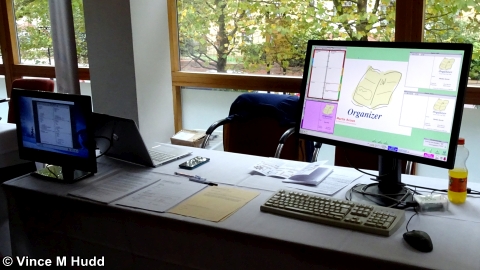
Version 2.28a, which was released at the 2018 Wakefield Show, benefited from a mixture of small enhancements and minor bug fixes over version 2.28, released at the 2017 London Show, including better communication with Sine Nomine’s RiscOSM application when calling up a map based on a postcode.
Rob Coleman
VideoNuLA is a truly impressive add-on for the BBC Micro, providing a palette of 4,096 colours to Acorn’s classic 8-bit system, which originally sported a palette of just eight (plus eight alternating combinations). The add-on also provides smooth scrolling, bettering the native one-byte-at-a-time ability which meant the number of pixels scrolled at any one time was dependant on the screen mode. Its designer, Rob Coleman, was showing off the board and answering any question people had about it.
A working BBC Domesday system could also be found on Rob’s stand. A multimedia project that was put together for release in 1986 to mark the 900th anniversary of the Domesday Book, the data was stored on laser discs for playback on a system based around a BBC Master.
And as if that wasn’t enough, Rob was also demonstrating the use of a Raspberry Pi as a Tube co-processor for the Beeb, to emulate the various different second processors that were available for the 8-bit machine.
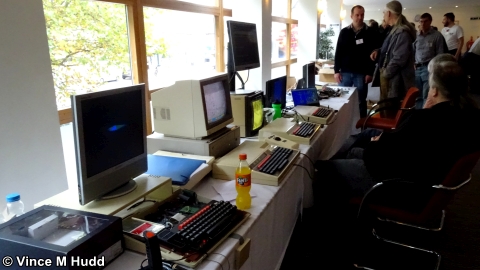
ABUG
The Acorn and BBC Micro User Group (ABUG) is a group that largely operates via the Stardot forums, and organises a number of events where members get together to show off and discuss their mutual projects, collaborating, and helping each other out – perhaps with a bit of programming, perhaps by repairing old kit – and so on.
Jason Nicholls was at the London Show representing the group, with a selection of computers running various pieces of software.
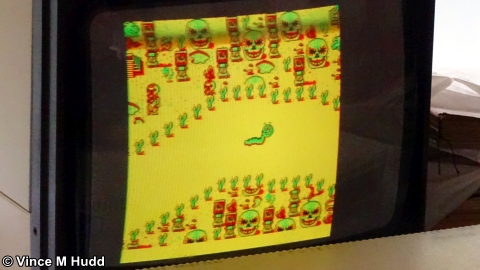
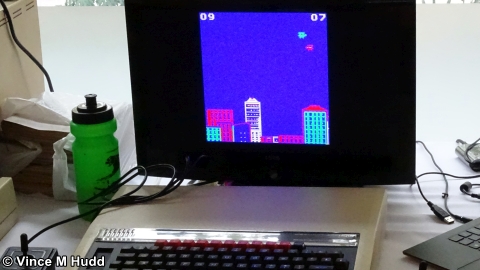
BooBip
The onomatopoeic BooBip (an interpretation of the BBC Micro’s start-up sound) is a potential source of hardware upgrades for the BBC Micro, and Chris Morley was showing off some of those upgrades, as well as demonstrating full-motion video on a BBC Micro via the Tube interface.
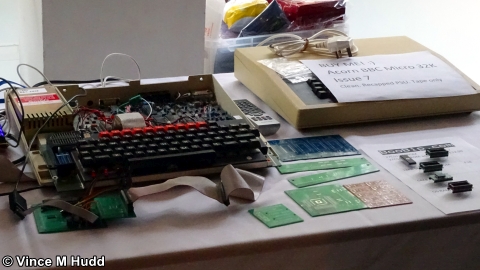
Charity
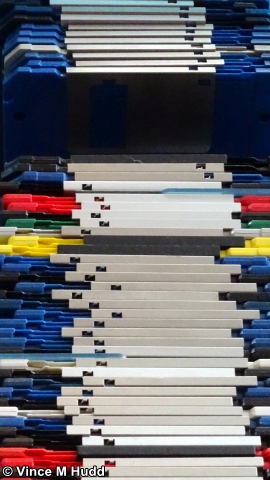
The charity stand was next and, as usual at the London Show, it was raising money for Combat Stress, a charity with the very worthy aim of looking after the mental health of veterans, dealing with problems such as post-traumatic stress disorder, anxiety, and depression.
A total of £365 for the charity was raised this year, which is an impressive total, so well done to those who helped out on the stand, and to anyone who bought or donated anything.
RPCEmu
Next up came a solution for getting your RISC OS fix via another platform with RPCEmu, an open source RiscPC/A7000 emulator, originally developed by Sarah Walker and now under the very capable hands of Peter and Matthew Howkins.
A few days before the show, the brothers had released version 0.9.1 of the software, which benefited from a number of fixes and under the bonnet improvements but with some nice user interface additions to boot, such as a reminder of how to leave full-screen mode on entry, and the ability to take a screenshot from the File menu.
The stand also had a Lego-theme to it – not an unusual thing – with a Raspberry Pi-based Lego laptop, and a group of Lego minifigs and a giant spider (well, to the minifigs, not to real people) congregating around a Lego leaflet holder.
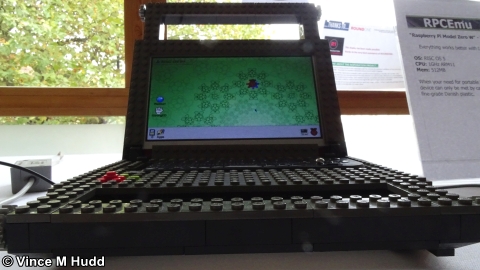
BBC Preservation
If you know your (Acorn) computing history, you’ll also know how the BBC Microcomputer came about, and that it was used by the BBC in its Computer Literacy Project. The computer also established itself in providing on-screen graphics for TV programmes, forming part of the Millipede Prisma Graphics system – and when the more capable Archimedes computers were produced, they in turn took on that role. We will all have seen the graphics produced by these machines in broadcast TV over the years – although, at the time we may not have all realised which computers were producing them.
Paul Emerton’s BBC Media Preservation display – consisting of equipment secured from Round One, a company formed after the closure of the BBC Special Projects department – featured a fairly famous example of this: a machine running the National Lottery graphics.
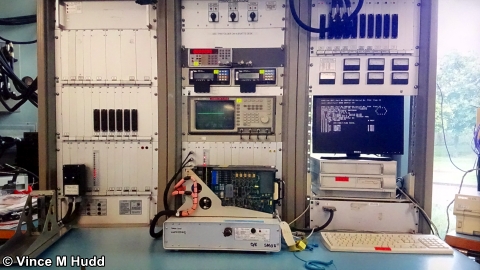
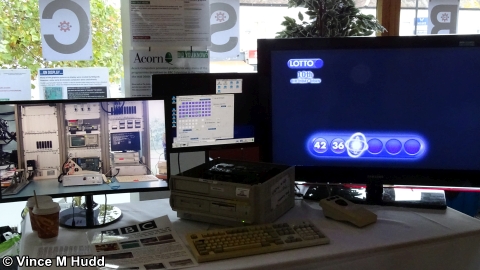
RISC OS Open Ltd
At the far end of the main hall, RISC OS Open Ltd (ROOL) could be found. Originally charged by Castle to maintain the RISC OS sources under their shared source licence, the company continues to fulfil a similar role on behalf of RISC OS Developments under the open source Apache licence.
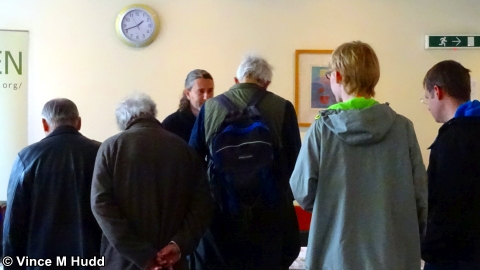
The day before the show and to mark the change of licence, it was announced that the operating system sources had been up-versioned to 5.26 for the latest stable release – essentially the same as 5.24, but now under the open source licence – and to 5.27 for the in-development versions, from 5.25, along with various changes to the source repository as necessary.
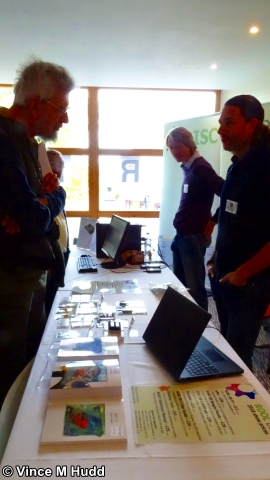
At the show itself, as well as selling the usual range of software, manuals, and other merchandise, Steve Revill and the team were answering questions from visitors about the change, and what the future held – both in terms of concrete plans, and the possibilities opened up by these new developments.
Stepping into the show theatre, Steve gave one of the days talks, in which the audience was able to hear the ROOL perspective on the recent licence change, and how it may affect them in future. For example, an important consideration with a fully open source RISC OS is the cost of the development tools – that cost is a significant barrier for people coming to RISC OS with a view to developing (particularly the OS itself). However, sales of the tools are currently an important part of the company’s income stream – so making them free is a significant step that requires careful consideration.
Another interesting point made during the talk was… well, I’ll just quote Steve word for word at 26:07 into the video:
“We’re also looking at working with third parties on bringing RISC OS to new platforms, and there’s one in particular that we know about that I can’t talk about but is imminent…”
If Steve couldn’t talk about it, then I’m guessing it wasn’t the laptop that R-Comp were showing off because that wasn’t a secret as of the show. So what was he referring to? Is it still being worked on and therefore still on the cards? Or did it not progress? Will I find the answer when I finally look at the videos from the Southwest Show? (Who knows, but I need to get on with that as soon as possible anyway!)
Soft Rock Software
The first edition of the Soft Rock Software Collection was again available from my own stand, featuring the various budget games I released in the early 1990s, along with WebChange, Seek’n’Link, WaitUntil, and more.
The RiscPiC-mini cases for the Raspberry Pi were also available, along with prototypes of the RiscPiC-standard cases, which are slightly wider than the -mini, and therefore look a little more like the RiscPC that inspired them.
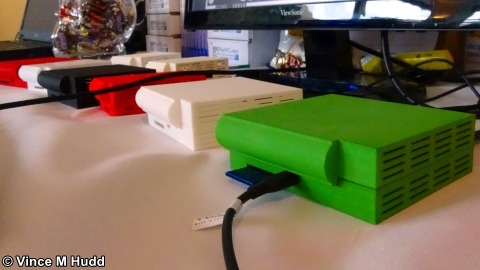
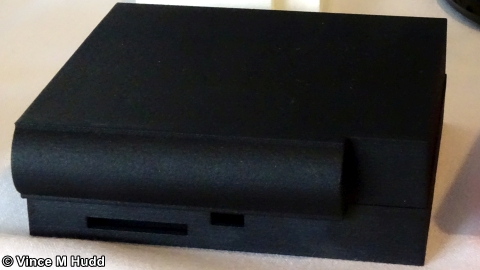
3rd Event
Immediately next door, Quincy Coleman’s 3rd Event Technologies had an impressive set up to show off his Advanced Music Construction System (AMCS).
The software is a MIDI music sequencer, originally designed for use on an A3000 – but rather than run on RISC OS, it actually includes its own operating system and replaces RISC OS, and Quincy makes the bold claim that it’s the only embedded music production OS in the universe. It has since been ported to an ARM-based netbook from Wondermedia.
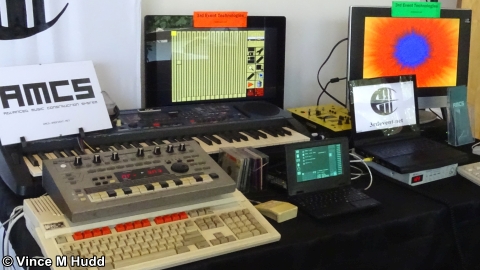
In amongst all the gear on the 3rd Event stand, easy to miss if you didn’t realise it was there, was an old set top box from Acorn/Xemplar.

Tricky Gaming
Richard Broadhurst’s Tricky Gaming was next, located between the two sets of doors leading into the side room that formed part of the show. Richard had several BBC Micro’s set up, running a selection of games – some old, and some much newer such as Richard’s own Carnivale, a port of 1980 Sega arcade game Carnival.
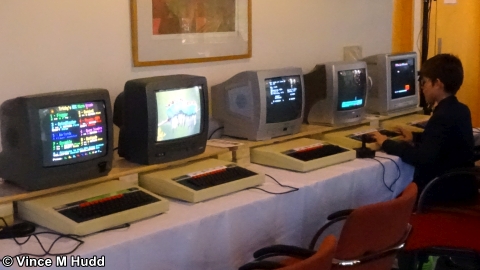
Riscy Robots
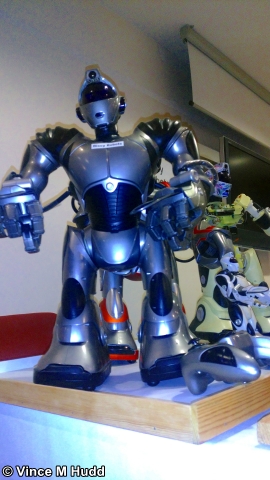
Nipping into the side room at this point, the first of four exhibitors located in there was Neil Fazakerley with his Riscy Robots display – featuring amongst other things, well, um, robots.
Also on display was a series of different types of motor, all controlled via the GPIO lines on a Raspberry Pi running RISC OS, with the actual program written in BBC BASIC – apparently it’s an ideal language for use with GPIO lines – and he even had a print out of the program available for people to read through.
And Neil was inviting people to pick up his cube and give it a twist! That cube containing an accelerometer and gyro chip, connected to a Raspberry Pi and with a program (in BBC BASIC again) reading it and displaying information about the cube’s orientation, etc.
CJE Micro’s / Fourth Dimension
The second exhibitor in this room was the little shop with a lot of stock, aka CJE Micro’s and The Fourth Dimension.
Both Chris Evans and Andrew Conroy were present, having made the trip to Feltham from Worthing with a wide selection of products squeezed into their car – everything from small components and connectors, all the way up to fully fledged computers.
Amongst the latter, the pi-topRO 2 was making its show debut. A long time coming due to technical issues (the lack of API details needed to get some RISC OS software components working), the laptop is a successor to the original pi-topRO. The new version of the device sports a slightly larger screen (14″ versus the 13.6″ of the original) operating at a notably higher resolution (1920×1280 rather than 1360×768), an improved keyboard (87 versus 82 keys), and so o n. If you like your laptops to be bright green, then this could well be the one you want!
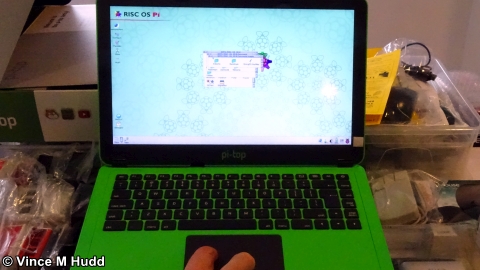
Chris Evans gave one of the day’s talks, in which he showed off the pi-topRO 2 to the audience, and in doing so pointed to a tiny item inside the case; a real time clock module – the smallest home-brewed product from the company. The tiny item – a touch smaller than a pound coin – is suitable for either a pi-top or a pi-topCEED, connecting to the system’s GPIO connector. (For those unfamiliar, the pi-topCEED is a design that puts the Pi into a sort of all-in-one PC form factor – essentially a small monitor, to which you attach your keyboard and mouse, etc.)
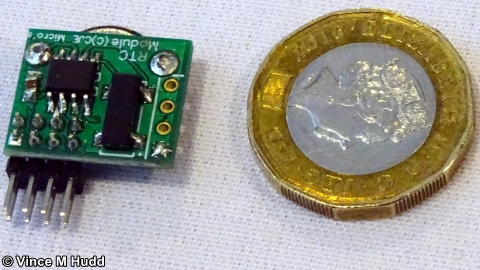
AMCOG
With yet another new game available to buy, and several computers set up so that people could play it and the company’s others, AMCOG Games had the next stand.
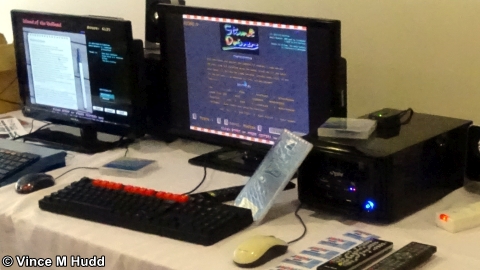
The new title for the show was a top-down racing game, in which the player is up against a number of computer controlled cars in a three lap race. With the title Stunt Racers, quite clearly it’s not a straightforward race track – there are obstacles to overcome, from hazards such as oil spills, to coaches blocking the way, with handily placed ramps allowing you to jump over them.
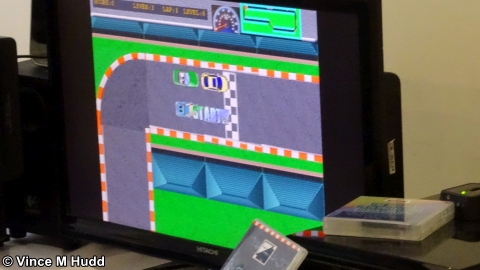
As well as this and the other games, AMCOG has a development kit for writing games, which in some cases has been used for the various titles available, and in others has had code fed into it from those titles – and one of the components provided as part of that kit is the RDSP sound synthesiser, which Tony Bartram is developing to offer better sound facilities to modern RISC OS kit.
Steve Drain
The final exhibitor in the side room was Steve Drain who had brought along a number of things for people to look at, try out, and discuss – both hardware and software.
Hardware included some of his ‘Pip’ computers, which are all based around versions of the Raspberry Pi, and began life as a goal to case the Pi in such a way that it was both suitable for plugging in to the Motorola Atrix Lapdock (a laptop-style keyboard and screen, designed to allow certain Motorola phones to be plugged in and thereby be used like a computer), but also to make it neat and tidy to boot.
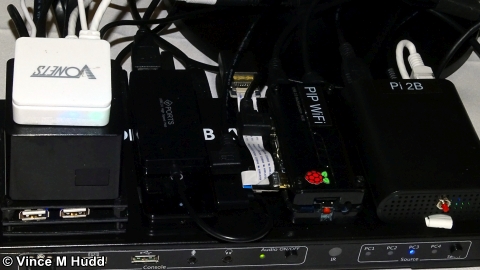
Steve’s software includes Basalt, which offers a number of enhancements to BBC Basic for those who program in it, and a fairly new item is Crunchie – a BBC BASIC cruncher, itself written in BBC BASIC. A cruncher is a tool designed to shrink the size of a program by changing variable names from something that (should be) meaningful to shorter alternatives, remove comments and white space, and so on. In theory, the resulting program should function identically to the original, but take up less disc space (and memory, when running), and may even be faster. The trade-off, however, is that the result of crunching can be a program that is less easy to read, and therefore maintain – so always keep the original!
Drag n drop
Back in the main hall, Christopher Dewhurst had the most recent issue of Drag ‘n Drop available to buy on USB flash drive – on which it was accompanied by every preceding issue to date. In addition, he had books in his ‘Book of’ series – Draw Stuff, and Arcade Games – available to buy, and a collection of 55 BBC Micro books on a single CD.
Steve Fryatt
In return for a crisp fiver, Steve Fryatt was selling the latest versions of all his software on a CD. That tasty collection includes grumpy home accounts package CashBook, along with PrintPDF to make it a doddle to produce reports as PDF files, Locate for then finding those files on your hard drive if you misplace them, some neat little desktop games, and so much more.
Adrian Lees – Aemulor and Geminus
Adrian ‘Mr Freeze’ Lees had the next stand, where he was demonstrating Aemulor and Geminus.
Originally written to bridge the 26/32-bit gap on the Iyonix, Aemulor allowed 26-bit software to be run on the 32-bit version of the operating system. This meant that when people purchased the new computer from Castle, they could bring more of the software over from their old 26-bit machines, and continue to benefit from its use.
With RISC OS having since been ported to a number of additional 32-bit platforms, some of which have their own differences and requirements, Adrian has updated the software to provide that same 26-bit bridge to these platforms – there’s even one targeting RPCEmu – and best of all, while the original Aemulor was a commercial product, these new versions can now be downloaded for free.
Geminus was another commercial product that is now available for free – at least in its old form. Running on the Iyonix, the software offered multi-monitor support, screen rotation (if you had a monitor that could be rotated so that it could be used in portrait mode), and graphics acceleration. There was also benefits to running it on older RISC OS computers, such as the ability to easily rotate/transform JPEGs.
A newer version of the software has been built, however, that makes use of the NEON co-processor, allowing accelerated block copies and fills. Adrian first demonstrated this at the 2018 Southwest Show, where it was running on R-Comp’s ARMX6 and providing a greatly improved desktop experience, for example with window drags (particularly over a photographic desktop background) being much smoother than without.
Shortly before the London Show, this version of Geminus became a commercial product from R-Comp’s !Store.
RISCOSbits
RISCOSbits came next, where Andy Marks, was proudly – and somewhat ironically – declaring that size matters!
Products available from Andy include such gems as the PiSSDup, a case for the Raspberry Pi that includes an SSD adaptor to form a small – possibly the smallest – SSD computer running RISC OS. See? Ironic!
The RISCOSbits range isn’t limited to the Pi, however, with the Deuce Case, developed from the marginally older Pi-Llok Ace, able to house either a Pi or a Wandboard Quad. An ideal solution if you purchase R-Comp’s ‘kit’ version of the ARMX6, the Deuce has room for an SSD yet only has a small footprint on the desk at only 15cm x 15cm. See? Ironic!
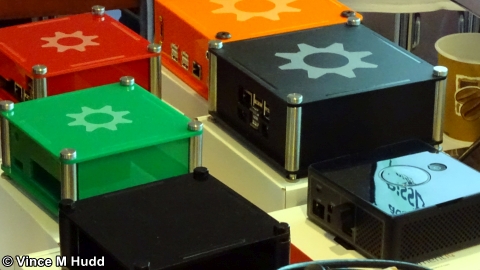
Continuing the arrangement previously forged with Ident Computer, this stand was also the place to buy Ident’s RiscCE cases for the Raspberry Pi – a clever, 3D-printed design that includes multi-slice options, allowing a second Pi running Raspbian to be used and controlled from the first Pi, obviously running RISC OS. Another version, called WispyCE, was able to accommodate a Raspberry Pi for RISC OS, and RISCOSbits’ solution for RISC OS WiFi connectivity, Wispy.
A new system was the PiHard, a budget Raspberry Pi system with a choice of which Pi (of three) to use, the amount of SSD storage, and which case (of three options), and the option of a USB port brought to the front of the case, and the inclusion of a Real Time Clock module – and the London Show also featured a couple of special editions called PiHard with a Vengeance.
Sine Nomine
And so we come to the final exhibitor of the show, Sine Nomine Software.
A new version of RiscOSM brought with it a style editor, which allows you to customise the way particular features of maps are drawn, making those things which are more relevant to your use case more prominent, and so on. Matthew demonstrated this in his talk, and it looks like a very well thought out and comprehensive feature.
Although not a finished product, Matthew Phillips was also talking about a new application developed to work alongside RiscOSM, and which had been made possible thanks to the release of a new AcornSSL module, bringing more up to date security protocols to RISC OS. The software can connect to online resources such as Flickr and download photographs linked to a particular location – so you can check out routes and sights ahead of any trip.
And with that, this report of the London Show 2018 is complete, with just a few usable pictures remaining:
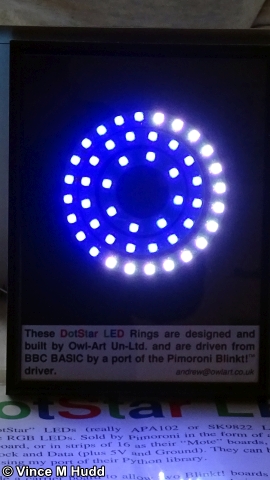
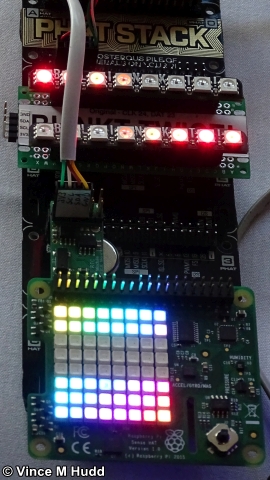
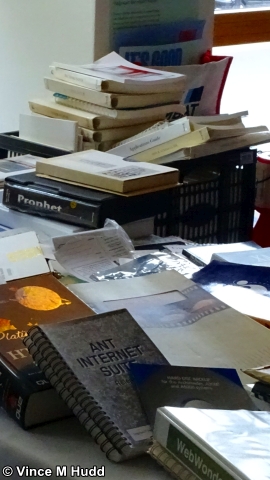
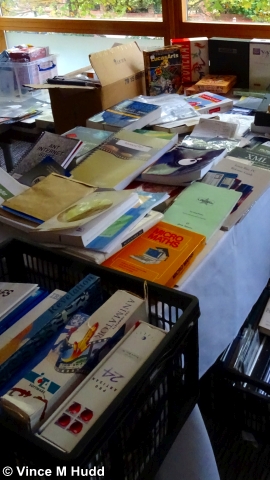
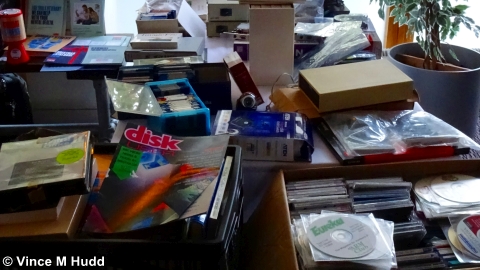
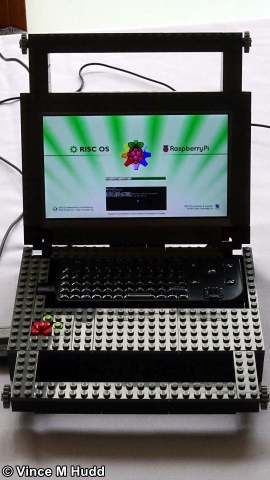
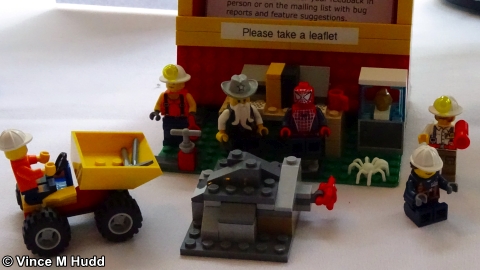
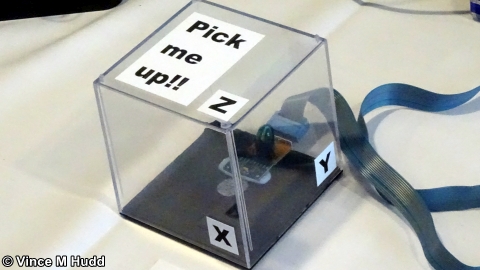
The show felt busy, though I understand visitor numbers were broadly similar to the previous year – and thanks to both the big news about the new licence and the news of a laptop, it certainly felt buzzing.



